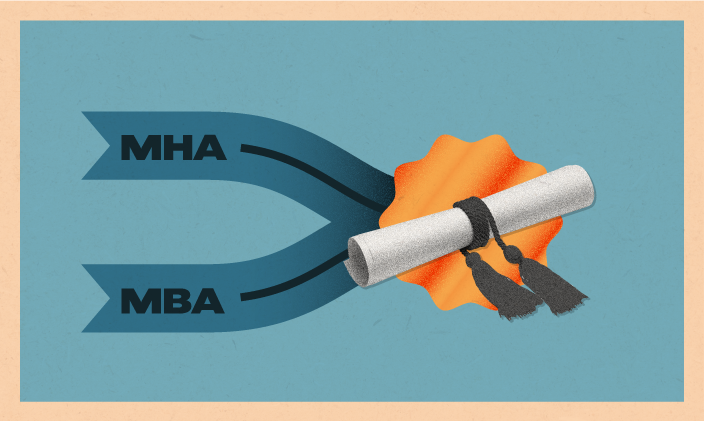
Online Health Management Degree
Bachelor of Science in Health Management
With a bachelorŌĆÖs in health management program, youŌĆÖll prepare for manager-level roles in the dynamic and evolving healthcare industry. YouŌĆÖll develop in-demand skills in strategic decision making, regulatory compliance, finance and technology. These will help you prepare for healthcare management opportunities.
Our Bachelor of Science in Health Management (BSHM) degree offers significant flexibility in transferring existing credits, making it well-suited for allied health professionals or students with an associate degree in healthcare. Leverage your existing experience, apply previous credits and pursue an education in health management.
- Transfer-friendly options for those with healthcare experience.
- Opportunity to pursue management occupations in the healthcare industry.
- Focus on financial strategies, regulatory guidelines and technology factors affecting public health.
Ignite Your Passion
Start when you're ready
Courses
Browse courses for your online health management degree
Education should hold practical value. ThatŌĆÖs why our health management program is built with input from industry leaders. We ensure what you learn is current, relevant and reflects the scenarios youŌĆÖll face in todayŌĆÖs healthcare industry. This is important in a field changing as quickly as healthcare.
Look for this icon to see which skills youŌĆÖll learn in a course.
Health management degree requirements
YouŌĆÖll need 120 credits[1] to╠²complete this online Bachelor of Science in Health Management degree. Your course schedule may vary based on transferable credits or credits earned through the╠²UniversityŌĆÖs Prior Learning Assessment.
Our student-centric health management program courses cover the core aspects of health administration while exploring more detailed specialty areas like human resources in health care and data analytics. Our practitioner faculty employ empathy, storytelling and significant video content to lend a human touch to our courses.╠²
HereŌĆÖs where youŌĆÖll pick up the bulk of your program-specific knowledge. YouŌĆÖll learn skills in key areas, such as auditing, budgeting, coordinating, decision making, planning, marketing, researching and more. These will prepare you for health management roles in a dynamic and evolving industry.
HereŌĆÖs╠²where youŌĆÖll explore additional topics related to the field of healthcare. Since health management is very broad, our elective core courses give you the opportunity to expand your healthcare knowledge with topics such as healthcare delivery or electronic health records.
HereŌĆÖs where youŌĆÖll study different disciplines to lay the foundation for your health management degree. You may learn soft skills, which are important for working in healthcare, like effective communication, critical thinking and team building. Many of these courses may be fulfilled with transfer credits.
HereŌĆÖs╠²where youŌĆÖll explore topics of interest, whether related to your field of study or not. You might want to pair your healthcare knowledge with topics youŌĆÖre passionate about like cultural diversity, environmental science, psychology, human development or ethics.
[1] Total program entails 120 credits, though applicants must have a minimum of 30 program applicable college-level credits (up to 87) to enroll into the BSHM program, which are applied toward total program credits. Students with more than 30 transfer credits may finish in less than 3 years.
Schedule
Your academic counselor will help you schedule your courses for the online health management degree.
The Bachelor of Science in Health Management degree also allows you to complete two of the required courses for a Master of Health Administration while finishing your bachelorŌĆÖs degree.
Earn career-relevant skills in weeks ŌĆō not years.
Learning shouldnŌĆÖt take years to put into practice. ThatŌĆÖs why weŌĆÖre empowering you to build career-relevant skills with every five- to six-week course.
WeŌĆÖve worked with the labor market researcher Lightcast to identify in-demand skills for occupations and mapped those to our related associate, bachelorŌĆÖs and masterŌĆÖs degree programs.
Tuition
Paying for school
Tuition is based on number of credit hours per course. Courses are typically 3 credits, but can range from 1-6 credits. Costs do not include savings opportunities like transfer credits and scholarships.
What affects the overall cost of my program?
Your full program cost can vary by:╠²
- Savings opportunities.ŌĆ»Your cost could be reduced with eligible transfer credits, scholarships, employer discounts and more. Students with eligible credits and relevant experience on average saved $11K and 1 year off their undergraduate degree at ░«╬█┤½├Į.
With our Tuition Guarantee, you pay one flat, affordable rate from the moment you enroll to the day you graduate from your program.
Discover ways to save time and money on your degree with our Savings Explorer┬«╠²tool:
Other ways to save on time and tuition
Because we believe everyone deserves an affordable education, we work hard to help our students achieve one. HereŌĆÖs a few ways you can save time, save money and avoid starting from scratch.╠²
Transfer credits
Your prior eligible college credits can lower your cost and help you graduate sooner. As a transfer-friendly university, we accept eligible credits from 5,000+ accredited institutions.╠²
Employer tuition benefits
Are you employed? Check to see if your employer has an alliance agreement with us for education benefits. This can help you save money while gaining skills that could apply to your job.╠²╠²
Credit for life experience
We look at all your relevant experience, from parenting to past jobs, to help you get the college credits you deserve. For every 3 credits earned, shave 5 weeks off your degree.
Alumni savings
Are you a ░«╬█┤½├Į alum? If so, youŌĆÖre eligible for special tuition rates and can save up to $2,880 on a bachelorŌĆÖs degree. You can also save with an alumni scholarship.╠²
Military savings
If youŌĆÖre an active-duty service member in the U.S. Armed Forces or an eligible spouse or dependent, you may be eligible for a lower, military tuition rate and can save on tuition.╠²╠²
National testing providers
Do you have expertise in a specific subject? Earn college credit based on your performance on national, standardized tests to save time and money on tuition.╠²
We can help you get started
Chat with an experienced advisor who can guide you through tuition, financial aid, scholarships, transfer credits and more.
- View 1
- View 2
- View 3

Budget & borrow
How to pay for college
Paying for school can be intimidating, but weŌĆÖre here to help you make sense of it. Our finance advisors can walk you through your options like federal financial aid and savings opportunities to minimize your debt. Plus, we can help you figure out your financial plan.
Careers & Outcomes
What can you do with╠²a Bachelor of Science in Health Management degree?
Healthcare is a growing field because of its unique position in society as a necessity. As such, thereŌĆÖs a demand for health management professionals who can build systems, improve outcomes, efficiently deliver╠²services and predict utilization trends. You can leverage your education to help prevent health problems and design effective healthcare solutions that can make an impact on public health and the wellbeing of others.

When you earn your Bachelor of Science in Health Management degree, youŌĆÖll be equipped with a concrete set of skills you can apply on the job. YouŌĆÖll learn how to:
- Evaluate financial strategies related to the management of health care organizations.
- Examine regulatory guidelines that impact the health care industry.
- Assess technology factors that impact the health care industry.
- Analyze management principles and strategies within health care organizations.

Top skills learned in this program:
Compliance
Finance
Management
Technology

A BS in Health Management can help prepare you to be a:╠²
- Office manager
- Practice manager
- Program manager
- Health manager
29% growth
According to the╠², job growth for medical and health services managers is projected to be╠²much faster than average between 2023 and 2033.
The BLS Projected Growth for 2023-2033 is published by the US Bureau of Labor Statistics. This data reflects the BLSŌĆÖ projections of national (not local) conditions. These data points are not specific to ░«╬█┤½├Į students or graduates.
Health management industry spotlight
Health management is a more expansive industry than people may initially envision. The field encompasses not just hospitals, but also rural clinics, retail health locations and healthcare-focused organizations, such as medical equipment, pharmaceutical companies, consumer healthcare products and more. Since the healthcare industry is a fast-growing and diverse field, this program can be quite beneficial for your career.
24,500,000+
The number of healthcare and social assistance employees in the U.S. in 2023.
Source:╠²
56,000+
The number of medical and health services manager openings projected each year, on average, over the decade.
Source:
Admissions
Apply for free ŌĆō no application fee, no obligation.
Starting your online health management degree is a big decision ŌĆö and we want you to feel great about it. ThatŌĆÖs why we remove obstacles from your application.
- No SAT/ACT required╠²
- No essay required╠²
- WeŌĆÖll request transcripts at no cost to you, when possible, and we accept eligible credits from over 5,000 accredited institutions.
How to enroll at ░«╬█┤½├Į
Receive 1-on-1 support
You have a support team of real people you can lean on. And our academic counselors, who are with you every step of the way, have earned a 5-star rating from 90% of our surveyed students.[1]╠²Start a conversation with an enrollment representative today.
[1] Transactional Survey, August 2021-22 (18,645 respondents)

Call or chat with us 7 days a week.

Gabriel G., Enrollment Rep
Receive 1-on-1 support
You have a support team of real people you can lean on. And our academic counselors, who are with you every step of the way, have earned a 5-star rating from 85% of our surveyed students.[1]
[1] Transactional Survey, September 2022-August 2023 (23,739 respondents)
Start a conversation with an enrollment representative today.
Call us at 844-937-8679 or chat with us 7 days a week.
Student Experience
Health management student experience
Online learning
Our engaging and interactive online courses include videos from faculty to add a human touch to the learning environment. Our faculty teach empathy too because of its importance in the classroom and in healthcare.
Flexible schedule
YouŌĆÖll take one course at a time to focus on a single aspect of healthcare. Our online health management courses are in an asynchronous format to help working adults balance work, school and family.╠²
Mimic real-world deliverables
YouŌĆÖll learn, practice and apply your health management skills through authentic assignments, which resemble what you would do in the healthcare industry, such as creating memos, proposals, summaries and more.
Join a Recognized Student Organization
High-performing health management students have an opportunity to join one of the largest honor societies, , which is part of the Association of University Programs in Health Administration.
Around-the-clock support and resourcess
You have a support team available up to 14 hours a day, 5 days a week.╠²

Faculty Spotlight
Healthcare professionals dedicated to you
Your success is a top priority for our faculty members, who bring an average of 28+ years of professional experience to the classroom. Their real-time, real-life experience in healthcare helps bridge the gap between academics and industry knowledge. You can feel confident that what youŌĆÖre learning is relevant for your future career.
Accreditation
Accredited for 45+ years
Since 1978, ░«╬█┤½├Į has maintained institutional accreditation by the Higher Learning Commission (HLC), . Learn more about the value of ░«╬█┤½├Į accreditation and how it benefits our students.
Healthcare management-related articles
Frequently╠²asked questions about╠²the Bachelor of Science in Health Management degree
Health management is a field of study, typically designed for allied health professionals, focused on overseeing the functions of a healthcare facility. These might include hospitals, rural clinics, pharmaceutical companies or other similar organizations.
Working in this dynamic and evolving field requires a solid foundation in business communication, financial management, human resources, organizational behavior, project management and financial management.
According to the Association of Schools Advancing Health Professions (ASAHP), allied health professionals assist with the delivery of services related to the identification and prevention of diseases and disorders, diet and nutrition, rehabilitation and health systems management.
Allied health professionals fall into two categories: technicians (assistants) and therapists/technologists. Technicians perform procedures with an educational background spanning about two years while therapists and technologists require more intensive educational curricula and procedural skills.
Allied health professionals include, but are not limited to:
- Dental hygienists
- Diagnostic medical sonographers
- Dietitians
- Medical technologists
- Occupational therapists
- Physical therapists
- Radiographers
- Rehabilitation counselors
- Respiratory therapists
- Speech language pathologists
While there are many similarities between health management and health administration, health management focuses on the larger business and regulatory needs of an organization. Health administration, on the other hand, focuses more on the oversight of personnel and practices within a department or division.╠²
This online degree is designed specifically for allied health professionals, such as dental hygienists, medical assistants and speech, physical or occupational therapists, who want to pursue an education in health management. It can help prepare you to be an office manager or program manager.
Our health management program is designed to be flexible, so you can prepare for a management role in healthcare while you work and take care of family. If youŌĆÖre an allied health professional, you can now apply your previous course credits toward our Bachelor of Science in Health Management degree.
According to the , the job outlook for medical and health services managers is much faster than the average for all occupations. Employment of medical and health services managers is projected to grow 28% from 2021 to 2031. Additionally, about 56,600 openings for medical and health services managers are projected each year, on average, over the decade.
The BLS Projected Growth for 2021-2031 is published by the US Bureau of Labor Statistics. This data reflects the BLSŌĆÖ projections of national (not local) conditions. These data points are not specific to ░«╬█┤½├Į students or graduates.
No, an associate degree in an allied health profession is not required before you enroll in our online health management degree. YouŌĆÖll need at least 30 college-level credits to enroll into the BSHM program.
Applicants must have a minimum of 30 program applicable college-level credits (up to 87) to enroll into the BSHM program, which are applied╠²toward total program credits.╠²Students with more than 30 transfer credits may finish in less than 3 years.ŌĆŗ
Yes, we offer a masterŌĆÖs pathway for students pursuing a bachelorŌĆÖs in health management degree. You can complete two of the required courses for a Master of Health Administration while finishing your bachelorŌĆÖs degree. Reach out to your academic counselor for additional information.
While widely available, not all programs are available to residents of all states. Please check with a University Enrollment Representative.





